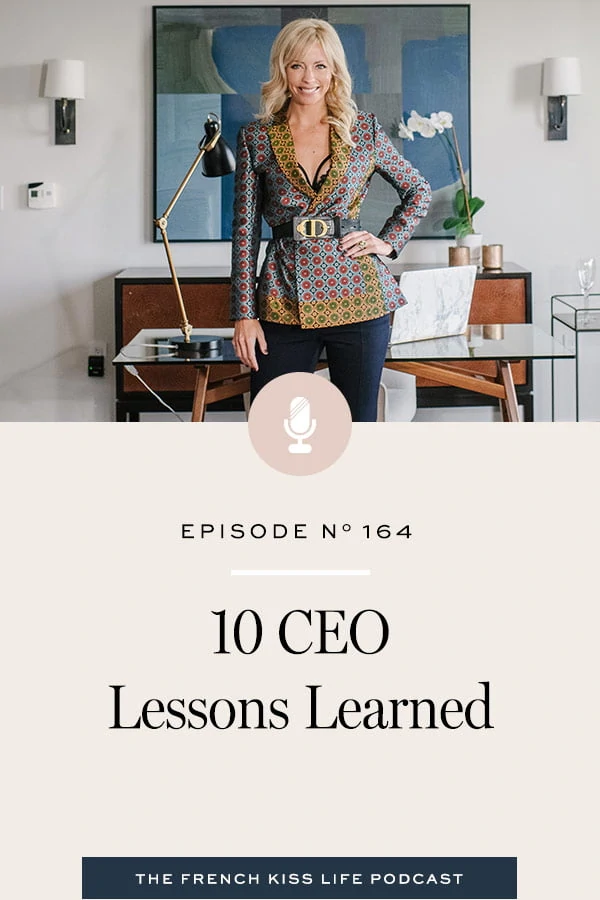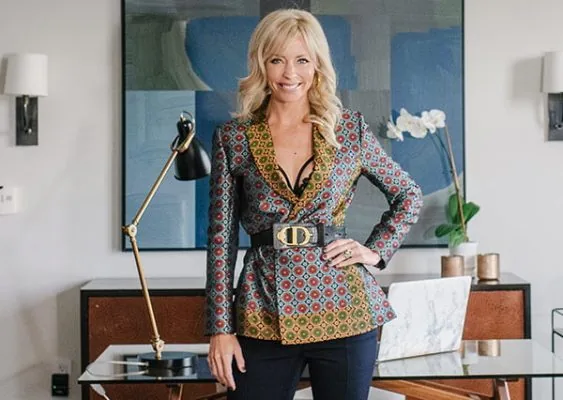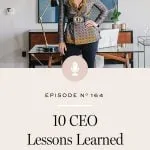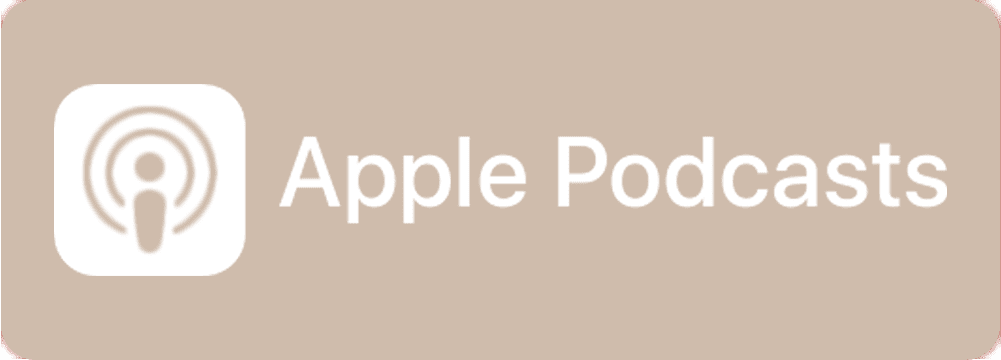Listen to the Full Episode:
Last year, my word of the year was CEO. I wanted to talk a little bit more about that, because last year was ones of my biggest years of growth ever – personally and in my business.
 While I did work hard, dream bigger, and stretch myself beyond my boundaries more than I ever have, I also did it with ease and elegance (most of the time – I’m only human!).
While I did work hard, dream bigger, and stretch myself beyond my boundaries more than I ever have, I also did it with ease and elegance (most of the time – I’m only human!).
There are ten key things I learned about being a CEO last year that I want to share with you in this episode. You don’t have to be a business owner to apply these lessons; they can apply just as well to being the CEO of your life.
I still have so much to learn in this area, but I would love to share what I’ve learned so you can learn alongside me.
In this episode I’m talking about the book that really helped me shift from being an entrepreneur to embodying CEO energy. I’ll tell you about why great CEOs make swift decisions, why they know their numbers, and why your number one job is to add value. And I’ll give you a peek into how I built and coached my team through our biggest year ever.
What You Will Discover:
- Why I loved the idea that great CEOs are lazy.
- How to identify the ways you might be constraining yourself, your team, and your business.
- The importance of making swift decisions.
- Key questions to ask yourself about who you will become by practicing your word of the year.
- What I learned about hiring people this year and why I had to grow a lot as a leader.
- Why it’s so important to level up your environment and surround yourself with inspiring people.
Featured on the Show:
- Download the Self-Image Manifesto and be the first to hear about amazing developments in our community!
- Join me for the mini-workshop: A 3-Part Cocktail to Your Best Year Ever!
- The Dream Atelier
- Choosing Your Word of the Year
- 5 Questions to Define Your Core Values
- Great CEOs Are Lazy: How Exceptional CEOs Do More In Less Time by Jim Schleckser
- Want to hear your name on the show? Leave a review of the show in Apple Podcasts (click the link to find out how) and you might just hear your name on the next episode!
- Follow me on Instagram!
- Find me on Facebook!
Episode Transcript:
I chose CEO as my word of the year last year, so I thought, in this episode, it would be fun to give you a little bit of an update and share with you some of the biggest lessons that I learned.
Bonjour, and welcome to the French Kiss Life podcast, where personal development meets style. I'm Tonya Leigh, Certified Master Life Coach and the hostess of this party, where we explore how to live artfully and well. Each week, I'll be sharing inspiring stories, practical tips, and timeless wisdom on how to elevate the quality of your everyday, and celebrate along the way. Let's dive into today's episode.
Well hello, my friends. Happy 2020. Maybe I said that already, but it feels like I haven’t talked to you in forever, only because I batched quite a few episodes, and then we had the holidays and New Year’s, and now I’m back. And so, I know you’ve been getting a podcast every Wednesday, but I’ve missed you. I feel like I haven’t been there because I haven’t been doing these every week.
Anyway, I’ve had such an incredible few weeks. I was actually sitting on the sofa, like the week before New Year’s. And I’ll admit, the last few New Years have been a little bit dull, sitting at home, watching the ball drop. Not that there’s anything wrong with that.
But this year, I just wanted something different. And I told Glen, I’m like, “I’m not sitting at home this New Year’s.” And he’s like, “Well, go, wherever you want to go.” And so I immediately booked a ticket to New York City and I took my daughter and her friend and we had just five incredible days just on a girls’ trip, just having great food and walking around the city.
I was even able to get some work done. I found something for one of my programs. It was just a fun time. Plus, I just love the city around the holidays.
Anyway, that is what has been up for me. And we are kicking off the Dream Atelier this week. And so that is super fun. I cannot wait to see these women see what is possible in the next 30 days when they get clear and they have a framework to bring their dreams to life. So, that is what is up in my world.
It is time for a Community Spotlight. This is the part of the show where I get to highlight one of you who has benefitted from the French Kiss Lifestyle. And today’s spotlight is on MMA8404 from Mexico.
She left me a five-star review on iTunes that says, “Jaime Tonya, I discovered French Kiss Life a couple of months ago, and today, I finally got up to date with all the episodes. I haven’t noticed how much influence it has had on me until I realized that I was listening to today’s episode while wearing silk pajamas, eating a platter of fancy cheese, and having a glass of rosé, things I always said I would love to do someday. After dealing with severe depression for four years, 2019 was a year of growth for me. Tonya reminded me of all of the things I dreamed about when I was a kid but never did, and later gave up on. I even enrolled in a French class a month ago, something I’ve been thinking about for 20 years. Merci beaucoup, Tonya. Thanks for being an inspiration.”
Well thank you, MMA8404, for that beautiful review. Why don’t we all, as a community, commit to no more waiting? Someday never happens until you decide today is the day. Really think about that. What would your day look like if you didn’t wait to use your best china or wear that dress you’ve been wanting to wear, or to call that person up and tell them you’re sorry or that you love them or to take the chance or to book the trip? What if we became women who refused to wait?
Recently, I asked on Instagram, what are some of the things that you want me to address on the podcast? And so many of you wanted me to talk about business; how I’ve grown my business, how I run my business. And quite honestly, it’s not something that I talk about a lot because I haven’t really felt qualified.
I don’t feel like we should be teaching things that we haven’t learned ourselves. And I know this is sort of a point of contention in the personal development world, but I’ve seen people out there talking about, “Let me teach you how to grow your business to six figures,” and they haven’t even done it.
And for me, it just doesn’t feel congruent. But I feel like I’m getting to that place where I’ve learned so much about growing a business, hiring people, having a team, creating systems, and truly being the CEO, that I feel like I’m ready to touch on these topics a lot more.
So, last year, I did choose the word CEO as my word of the year because I knew it was something that I wanted to be better at. I knew it was an area that I wanted to grow in. And so that word really shaped me and guided me last year.
And just for anyone that’s listening to this that doesn’t have a business, I want you to still keep an open mind and I want you to listen to this in context of looking at our life as a business. Because I can promise you, some of the lessons that I learned last year are applicable to you as well. So, as I’m talking about these lessons, just think about how can this apply to my life?
So, going back to my word of the year, one of the first books that I picked up – because it really spoke to me – the title is called Great CEOs Are Lazy. And some of you may know, I love the term leisurely hustling. I do believe deeply in you need to learn how to work smarter, not harder. You also need to take very good care of yourself. You need to slow down sometimes to speed up and you need to just sometimes just take a pause.
And so, the title of this book really grabbed my attention. But then, what I read in this book, I was like, “Whoa.” It’s so good. Because here’s the thing I’ve learned, that being an entrepreneur is very different than being a CEO. And I’ve been an entrepreneur, leisurely hustling, for the last decade.
And I realized, to have the kind of impact that I want to have and to reach a million women in the next four years and to really have an incredible team and add the most value that we can add to the world, I needed to shift my energy to being a CEO. So, let me share with you some of the lessons that I learned. And this book really got me to thinking differently about my business and the different hats that you need to wear as a CEO.
Because I know, for those of you who have businesses, and even for those of you who don’t, you’re so busy in your business, doing the little things like sending out emails and doing your budget, or you’re in your life just doing the dishes and the laundry and going to work, that you don’t really step out and look at your business or look at your life.
Michael Gerber, he talks about how you need to work on your business. You need to step outside of the day to day and really think strategically about your vision, where you want to go, what you need to make happen in order to get there. And I had just been in my business for so long.
So, when I picked up this book Great CEOs Are Lazy, I was like, “Okay, it’s time that I put on some different hats.” And last year, I will tell you all, was like the most phenomenal year in terms of the results that we were able to create. And I say we because it wasn’t just me. It was me and my team really coming together and unifying around the vision for French Kiss Life and what we want for our customers and our clients and all the things.
And so, let me share with you the top 10 lessons that I learned last year. And trust me, there were many more. And here’s the other thing I just have to share before I jump into the lessons, I’m still not done with this, you all. I feel like I’ve just hit the tip of the iceberg on this one. I know there is so much more growth and evolving to do as a CEO.
And so, this year, I chose the word amazed. And at the end of 2020, I want to be amazed at how much more I’ve grown as a CEO. So I’m still keeping that word and working on it and evolving in this role, but it’s so fun and so hard and so crazy. It’s all the things, so uncomfortable.
Okay, so let me talk about the first lesson that I learned as a CEO last year. As a CEO, you need to understand your point of constraint. So, a constraint is anything that is limiting or restricting your vision for the company. And for me, because I’m so drawn to the word elegance, what I loved about the way they talked about looking at your business, or your life, for any kind of constraint, it goes back to what I often say about elegance. And that is, it has so much more to do with what you get rid of than what you add.
And so, in the book, what he says is the point is that the single most important job any CEO of a growing company can perform is identifying the constraints that are keeping the organization from sprinting forward in the right direction and then allocating as much of their time as needed to remove them, thus freeing up space for the organization to perform more effectively.
And so he talks about how you have to put on your learner hat and actually get into your business; not working in your business, but really go into it with a very investigative and scientific mind without the judgment. Because, listen, you’ve done the best you can do. That’s what I kept telling myself.
I’m like, “Rock on, sister. You’ve gotten to this point. All is good. Now, let’s get in there, let’s get dirty and let’s look at what are the points of constraint that is keeping the company from growing.” And so, for me, it came down mostly to people.
I had been trying to run a growing business with just a couple of people and a couple of contractors. And everyone was stressed out and there were many late nights and tensions were rising. And I just knew energetically, I’m like, this is not the way it’s supposed to be.
And I had this story that I’m not good at hiring people and that it’s too hard and I don’t know how to manage people. And all of that was just BS and it was keeping me from stepping into my own personal greatness as a CEO. Like, I had to put on my big girl panties and say, “Hey, listen, if you want things to be different, you’re going to have to do things differently.”
And so, we brought on so many people last year. And that’s one of the reasons why we were able to achieve a lot more and also for me to have a lot more ease. And I will tell you, it’s scary. It’s scary to bring on people and now all of a sudden you’re like, “I am responsible for these people. I need to make sure that they get paid before me. I need to make sure that they have the resources that they need to be successful and to be there to help them and support them and coach them so that they can be the best in their role.”
But that is what a great CEO is. And so I felt the discomfort and I did it. and I’m still learning about hiring and managing people and I’m realizing I’m not that bad at it. in fact, I think I’m pretty good.
Also, when it comes to constraint, you can look at, like, how am I sewing myself down? So, for any of you that may be like I was, and maybe just have an assistant or a couple of people. I mean, we all start out the same, right? Not many people start out with 100 people working for them, especially us entrepreneurs.
You need to be thinking about how am I slowing things down? IS it taking me five days to write a blog post? Is that a point of constraint? How am I holding myself back so that the momentum of the company isn’t going as quickly as I know it could be?
Maybe it’s that you don’t have good systems in place. Or maybe it’s that you aren’t getting as many good leads as you want to get. All of these things are controllable. All of these things are fixable. But the first thing you have to do is identify what is slowing me down or what is slowing us down as a team? So, know your point of constraint.
The second lesson that I learned is that great CEOs make swift and speedy decisions. And they understand that a wrong decision is better than no decision at all. At least with a wrong decision, you know what doesn’t work so you can course-correct.
But if you spend a month deciding what software you’re going to use, that’s a month that you could have tried a couple of softwares and realized, “Oh, number two works better.” And talking about this, CEO Stephen Gorman said that, “A bad decision was better than a lack of direction. Most decisions can be undone, but you have to learn to move with the right amount of speed.”
Now, granted, there are times where maybe you need to step back and realize what is the energy driving this decision? Because if you’re making it out of fear and haste and anxiety chances are, you need to slow down. But, for the most part, most of us aren’t making decisions because we’re afraid of what the consequence is going to be. And so if you want to get the momentum in your business and your life going, you need to start practicing making more swift decisions.
A friend of mine is starting her business and she called me the other day because she had a story that she was stuck. I’ve had that story too, sister. I feel you. But she was just saying, “I’m so stuck. I’ve been trying to figure out my logo for the last month.” And I’m like, “What? You’ve spent a month on your logo? Like, at this rate, you’ll be 100 and you’ll be getting your first client.”
Like, seriously, that is a decision that number one, doesn’t really matter. You can change logos. Like, focus on giving your clients value. Focus on putting yourself out there. Focus on the really uncomfortable stuff versus pretending to take action by being indecisive about a logo. And so, if you want to be a really good CEO, you need to make those decisions and make them as quickly as possible.
the third lesson that I’ve been working on for a couple of years now that I think makes a great CEO is you’ve got to know your numbers. Now, I’ve always had this story that I’m not a numbers girl. Can any of you all relate? Like, I’ve had this story of, like, “The numbers don’t matter. It’s the energy that matters.”
And let me tell you, as long as that was my story, that’s how much anxiety I had. Those were my most anxious-filled years in business, when I wanted to put my head in the sand when it came to the numbers. And then I hired a CFO because my friend told me she was going to break up with me if I didn’t.
She knew. She was like, “This will be your saving grace. And so, I hired a CFO, in which I look at the numbers with weekly now. And I’m not just talking about financial numbers. Within our business and our team meetings now, we look at the numbers, the metrics of, you know, how many new leads do we have? How many new people are joining our social media platforms? How many customers do we have?
Like, really, knowing your numbers and looking at them with curiosity, looking at them with fascination and possibility – because a lot of you all look at the numbers and your mind goes crazy. You look at them and you’re like, “Oh my god, how is this ever going to work? I’m not good with math. I’m not good with numbers. I’m never going to have enough money. I don’t have enough clients.”
And no wonder you don’t want to look at the numbers. It’s painful to look at the numbers because, every time you look at them, you tell yourself this terrible story. I love looking at the numbers now because I realize, it’s just a numbers game. It really is. That’s all it is.
It’s finding the right people. It’s putting yourself out there. It’s sharing your message and seeing what works and what doesn’t work. And then letting it all work out the way it’s supposed to, and then coming back to the numbers.
I just find, the more I’m in the numbers, the less dramatic I am, when I just stick with the facts of the numbers. And so, for me, knowing my numbers, even when they haven’t been what I wanted them to be, has actually been really empowering.
It’s no more of, like, “Here’s our Facebook ad budget. I hope this works. I don’t know how much money I have in the bank, but let’s see.” And honestly, that’s how I ran my business for a few years. It was on a wing and a prayer. Thank goodness I prayed a lot.
But I just feel like great CEOs are courageous enough to look at the numbers and be objective and use them simply as data to look at what’s working and what’s not, do more of what’s working and less of what’s not working. But you must know your numbers.
And let me just add, this is for those of you who don’t even have a business because this isn’t just a business issue. This is a life issue of those of you who have a story that you struggle with money. And those of you that are struggling with money are the ones that are probably not looking at the numbers because you’re too afraid to look at the numbers.
But looking at the numbers and understanding them and being objective and forgiving yourself for anything in the past that happened with your money and freeing that energy up to be like, “Okay, now what? Let’s look at the possibility here.” That is when you get your power back. So, again, know your numbers.
So, the next lesson is to know what you value. Know your company values. And I talk about this in one of my podcasts that we can link to in the show notes, but I’ve just found that the more we clarify our values within the company, everything else becomes so much easier. We know what products to create. We know who to hire. We know how to market.
It just really informs everything that we do. And so, again, in your life, when you know your values, it makes decision-making so much easier. You know what you want to work on. You know what you want to say no to. You know who you want to surround yourself with. You know how you want to show up in your life. And so great CEOs not only know their values. They live out their values. They are an example of their values. They embody their values for the team, for the company, for their customers.
Okay, lesson number five that I learned last year – and I have always known this, and I’ve always practiced this. But last year, I really went deeper into it and understood the ramifications of it. And that is your job is to add value.
Now, yes, I have goals every year, financial goals for the company. You know, I look at who’s on the team, how much they make, how much I want to make, how much I want to have leftover to reinvest in the company. Like, I look at all of that.
But that’s not my driving force every day. Every day, I wake up and I ask myself, how can I add value today? And I think the thing that shifted for me last year is that I have, in the past, focused on adding value to our customers. But last year, what changed for me was, how can I add value to my team? How can I coach them? How can I offer them the resources that they need to be successful? How can I help them grow and evolve?
Because in my company, my team is my greatest asset. And so, as much as I’m there for my clients, like, last year, the big switch was I equally need to be there for my team. I need to be there for my team just like I coach my clients. And that was huge.
That was so incredible. In fact, just recently, someone on the team made a mistake and she was so upset, like heartbroken. And it meant the world to me that she cared that much, but it was a beautiful opportunity for me to coach her through that and just realizing now that my role as a CEO is to really lead not only the community but also my team. So, add value.
And what I want to say around this too is I know that when you have businesses and a life, which we all do, one of the things that we can start to get in the habit of is being resentful of our business or our life, you know. It can be, like, what is my business going to do for me? Or my business is causing me so much stress, or I hate my business.
And that is not the energy in which to create an incredible impactful business. I always look at my business as, it is such an honor and it’s such a gift that has been endowed upon me and I always come at it form, what can I give my business today? How can I add value to my clients? Whether it’s on social media or this podcast or in my paid programs or some of my meetups that I do? Like, how can I add value? How can I be of service today? How can I help others make their dreams come true and help them grow and evolve?
And the more value I add to my team and to my clients and customers and listeners and readers, the better my life gets. It’s like a boomerang. What you throw out comes back at you. And so, as a CEO, your role is to constantly look at how can I add value to my team and to my customers, and to life itself?
The next lesson has been the hardest for me because I’m loyal, and I really believe in the best in people and I really want things to work out. And also, I’ve seen in the past when I’ve been really desperate and I’ve hired people really fast. And so, I think great CEOs know that you hire slow and you fire fast.
And the years that I was struggling the most in my business was when I did the opposite. I hired fast and I fired slow. And here’s the thing; this is often a point of constraint in businesses. And that is people.
If you have the wrong person sitting in the wrong seat who is not a good fit for your organization or your company, they’re going to be a point of constraint. And you have to remember that your primary role is leading your company. It’s not being friends with the people that work for you, although I do love being friends with the people that work with me.
But that’s not my number one role. That is down on the list. My number one role is to be the leader, to be the CEO. And that means I have to decide, like, is there an employee who I’ve tried to coach, who I have tried to help, who have given all the resources to, who I’ve done everything that I can to make them successful and it’s still not working.
And that’s when you have to just let people go and let them go with love and don’t make them feel like they’re a bad person or that you’ve done something wrong. It’s just not a good fit, and that’s okay.
I think you also have to be very compassionate and have empathy for people. And I think, for me, I just always assumed that people are doing the best they can with what they know. And that doesn’t mean I have to keep them in the company, right?
Like, I want it to work out, but I also have to remember, as a CEO, my number one role is to lead the company and ensure that we are moving towards our vision. And so again, if there is someone that is slowing us down or who is not a good fit, you have to fire fast, period.
So, the next lesson that I learned last year that I think is so important – and fortunately, I had been practicing this a lot anyway because I tend to not stay in my industry only. But I feel like great CEOs step outside of their industry so that they can learn from other people ad gain other ideas and be inspired. Because, if not, we can become very myopic.
Now, there are some people in my industry who are mentors and my teachers who I admire and I respect. But if I only am ever in the personal development world, I am missing out on a plethora of ideas and inspiration that is available to me. And I feel like, as a CEO, your number one job is to think on a much bigger level.
And so, for me, that means I need to put myself outside of my comfort zone, outside of my box, and learn from people who are in other industries and who think differently than me and who execute differently than me so that I can learn things that I may never learn if I stay inside my box. So, expose yourself to other people in other industries.
Number eight – this is a big one – you need to put yourself in the right environments. You want to never be the smartest person in the room. You want to be in rooms where there are people that are so much smarter than you, that you can learn from, that you can gain wisdom from.
You know, one of the things that I’ve noticed, women will come to me and they’ll say things like, “How do you do this? How do you do that?” And that’s the wrong question, you all. You need to be asking me how I think. That’s the most important thing because how I think is the secret sauce.
So that’s why I want to be around people who think in a much bigger way than I’m currently thinking. And I want to start practicing that kind of belief system, those kinds of thought processes. Because how I implement it will probably be very different than how they implement it. But it’s the thinking that’s so important.
So, you want to put yourself in high energy environments where there are high expectations of you, where people demand the most of you so you can rise to the occasion, and who also can expand your own mind. So that’s number eight. And I feel like great CEOs do that and they do it often.
Number nine is surround yourself with truth-tellers. So, here’s what I mean by this; I’ve noticed that when you are a CEO and you’ve created something of some level, people start to tell you really amazing things, like, “You’re amazing, everything you do is great,” like you can do no wrong.
And sometimes, that might even be within your team, because you have to keep in mind, like, you’re paying these people, so they don’t want to piss you off. They don’t want to upset you. So they will tell you what they think you want to hear.
And as a CEO, I think it’s so important that you surround yourself with people who may not tell you what you want to hear, but they tell you what you need to hear. Y’all know what I’m saying, right?
Fortunately, I feel like my team, we have the kind of relationship where I invite feedback. And I even push them for feedback. I’m like, tell me what you think. Tell me how we could do better. Tell me how I could do better.
And it’s really great to have that level of relationship and safety with one another. But I do know, some of my CEO friends don’t have that and they start to get this really big ego and they can’t see the train coming and they’re on the track, when if they had some truth-tellers around them, they would be able to avoid all of that.
And I feel like Glen is that for me. Like, Glen is all about truth. Glen will tell me things that I’m like, ouch. But I know he’s coming from the right intention. I know he’s objective. I also know that he’s a realist, which sometimes doesn’t sit well with me because I’m an idealist.
But it works to have that level of honesty and that level of feedback so that you don’t get hit by the train. And so I feel like great CEOs are able to check their ego at the door and to realize that they can make mistakes and that they’re human and they need feedback just like everybody else and that they surround themselves with the right people who love them and want the best for them and for their company to just keep everything in check.
So the last lesson is probably the least sexy of all of them. And it’s one that I am still working on and I want someone to come in and save me, and I know that no one’s going to do it. So it’s up to me. But this one is all around systems.
And if any of you are familiar with Kolbe, I’m a quick-start. Which means I get an idea and I just go with it, and I’m like, “We’ll figure out the rest along the way.” And that works up until a certain point as an entrepreneur. But when you start thinking about having a business and scaling your business and keeping the service A-plus, that doesn’t work any longer.
And that’s been very difficult for me because I’m like, “Hey, guys, I’ve got an idea, let’s do it.” And then it’s like, “Oh wait, Tonya, we need to put some systems into place before we tackle that.” And so, this is something that I have not mastered yet and I’m going to be focused a lot on this year.
But when you think of systems, they are systems in place so that if I got hit by a bus tomorrow, or my COO got hit by a bus or anyone on my team – this is like the worst analogy ever because I don’t want any of us to get hit by a bus. But if something happened to us, someone could come in and keep things going. Things would keep running. They’re not dependent on one person being there. It’s running a self-managing company.
It occurred to me probably two years ago, like, I want to build French Kiss Life so that I can sit in the seat of doing what I really love. And what I really love is things like this, doing the podcast. I love coaching. I could coach my face off all day. I love retreats. I love getting together with the women in the community. I love the face to face interaction.
And so, in order to be able to sit in that seat as much as possible, I realized that I needed to put systems into place to scale. And so, for us, like, we’ve just been paying attention this year to, like, what do we get a lot of questions about? Or whenever there’s something that goes wrong, it’s a beautiful opportunity to create a system.
Whenever there’s any kind of confusion, we can look at what kind of system can we put into place so that this is no longer an issue? How can we make this business so much more elegant and efficient and simple?
And so, great CEOs know how to build systems to really support the value that they want to deliver to their customer. They know how to build systems so that the company can run, no matter what. And so that’s going to be a big focus for me this year, along with writing the book and doing all of the other fun things that I have on my agenda.
So again, there were many more lessons this year, too many to do in one episode. But these were really big ones for me. And I’m excited to step even more into this role. And when I think of the kind of CEO that I want to be, I can’t help but to think elegant.
Like, really, I want to make things as simple and effective as possible. I want to have a team that really embodies the values of French Kiss Life. And I want us to have so much fun on this journey of life.
So again, if you don’t have a business, I still want you to think about how these lessons apply to your life, really thinking about life being your business. And if you do have a business, I know how overwhelming it can feel, especially if you’re just getting started, especially if you don’t have a big team. We’ve all been there.
But spend some time with your CEO hat on. Spend some time thinking on your business, working on your business and thinking about how these lessons can help you grow to the next level.
It is time for J’adore. This is the part of the show where I get to share something that I love with you. And today’s J’adore is going to be a little bit different. It’s going to be more of a pep-talk. Because, of all of the things that I’ve done on this podcast, my J’adores have actually gotten the most, let’s just say negative, feedback.
I’m like, how is it sharing what you love gets negative feedback? But I had some people in the community that were really upset that I shared what – maybe I even said it, I don’t remember if I did, but I shared my love of this deck of cards called The Wisdom Deck. And they were upset that they think that I’m into tarot cards
And then I had someone who really was not happy that I was not including pictures of what it is that I share on this audio episode of the podcast. I’m like, I guess I could do it in the show notes on my blog posts, but I don’t. I give you the link, you can go check it out. And then I had a lovely French woman – she really is – but she was like, “You are just butchering J’adore, so just stop it.”
And I wanted to share with you all what happens when you start putting yourself out there and when you start being vocal about what you love, or even how you say the word love in another language. Some people will not love what you love. And they will even judge you for what you love.
And what if that’s all okay? Really think about it. The only other option is for you to deny what you love in order to make everyone around you comfortable, at the sake of you being honest to yourself and really allowing yourself the beautiful experience of just loving what you love.
I have had people that have judged me for my love of clothes, for my love of handbags. I’ve had people judge me for my love of personal development. I’ve had people judge me for my love of Glen… True.
People are going to judge you, but would you rather them judge the version of you that’s in love with yourself and in love with your life and totally honest with yourself? Or would you rather them judge the version of you that’s trying to please everyone?
I’ll be honest, when I had so much pushback when I mentioned these cards, and honestly, I feel like the women who were judging me for these cards, like, I totally get it. I mean, I grew up in a very religious home where you didn’t bring tarot cards in the house. I didn’t even know what a tarot was, honestly, until I was older.
And then I just started to question all of it. And for me, it’s such an energetic thing. And I think I mentioned this on that particular J’adore that I talked about. But I have seen some tarot cards and I’m like, keep those things away from me. They just didn’t feel good. I didn’t like the way the pictures looked, right? Just like a book. Like there are certain books you look at and you’re just like, “I’m not reading that. It just doesn’t feel right.”
But the cards that I mentioned on the podcast, like, every woman that I have ever known that has purchased these cards like love them. In fact, if you go to Amazon, there’s like 1300 five-star reviews for these cards, because to me, these cards are so full of love and wisdom. And I feel like it’s things that God or Jesus or whoever you believe in would say to us.
And so I was taken aback because these women had not even looked at the cards and they’re already judging me for something that I love. And I found myself, for a brief moment, wanting to convince them that I’m a good person and that these cards are great and they’re amazing and just to try them out.
And then I was like, no. They get to not love that and I still get to love it and stand strongly in my love of these cards. And so for this J’adore, that I probably just butchered how I said it, I just want to really convince all of you to give yourself the beautiful experience of loving what you love because you have desires planted within you that were meant only for you.
As I often say about desires, I feel like desire is God wanting to experience life through humanity. And so that’s why we all have such different desires, because there’s no way he or she could experience it through one person. So he or she is like, “Hey, you, go to Pairs. Hey you, be someone who likes to stay at home. Hey you, love handbags. Hey you, love minimalism.” That’s just how I think it works. And so to deny our loves and to deny our desires, I feel like, is to deny God himself or herself.
So that is my J’adore for you today. I just really want you all to love what you love unapologetically and be very mindful of not judging other people for what they love. We all get to love what we love. What if we just blessed all of it, my friends?
Have a beautiful week. I love you and I am so grateful, so, so grateful to have you in this community. I’ll see you next week.
If you enjoyed this episode and you want to dive even deeper into the French Kiss Lifestyle, let’s start with a makeover; a mindset makeover. You can download my free training, The 3 Mindset Makeovers Every Woman Needs, by visiting www.FrenchKissLife.com/mindset – because after all, mindset is the new black.
Enjoy the Show?
- Don’t miss an episode, subscribe via iTunes, Stitcher or RSS.
- Leave us a review in iTunes.
The Self-Image Manifesto
You’re Invited To Live An Extraordinary Life!
IF YOU LIKE IT, SHARE IT













